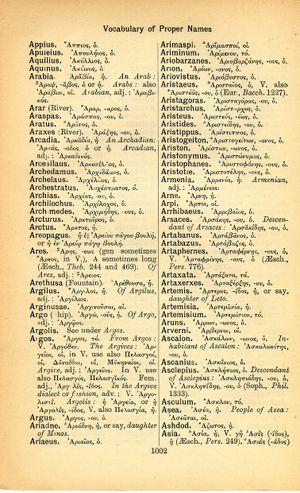Ares: Difference between revisions
From LSJ
Ξενίας ἀεὶ φρόντιζε, μὴ καθυστέρει → Cura hospitalis esse nec in hoc sis piger → Sei stets auf Gastfreundschaft bedacht und säume nicht
(6_2) |
m (Text replacement - "]]>" to "]]") |
||
| Line 5: | Line 5: | ||
}} | }} | ||
{{Lewis | {{Lewis | ||
|lshtext=<b>Ăres</b>: is, m., = [[Ἄρης]] | |lshtext=<b>Ăres</b>: is, m., = [[Ἄρης]],<br /><b>I</b> the [[war]]-[[god]] [[Mars]] (in Plaut. [[jocosely]] made to [[correspond]] [[with]] [[bellator]], [[warrior]]): si tu ad legionem [[bellator]] clues, at ego in culinā [[Ares]], Plaut. Truc. 2, 7, 54. (For the A, [[which]] is [[always]] [[short]] in Lat., cf. Lucil. ap. Scaur. Orth. p. 2255 P., and Mart. 9, 12, [[with]] [[reference]] to Hom. Il. 5, 31.)> | ||
}} | }} | ||
Revision as of 09:29, 13 August 2017
English > Greek (Woodhouse)
Ἄρης, -εως (gen. sometimes Ἄρεος, in V.), Α sometimes long (Aesch., Theb. 244 and 469).
Of Ares, adj.: Ἄρειος.
Latin > English (Lewis & Short)
Ăres: is, m., = Ἄρης,
I the war-god Mars (in Plaut. jocosely made to correspond with bellator, warrior): si tu ad legionem bellator clues, at ego in culinā Ares, Plaut. Truc. 2, 7, 54. (For the A, which is always short in Lat., cf. Lucil. ap. Scaur. Orth. p. 2255 P., and Mart. 9, 12, with reference to Hom. Il. 5, 31.)>

